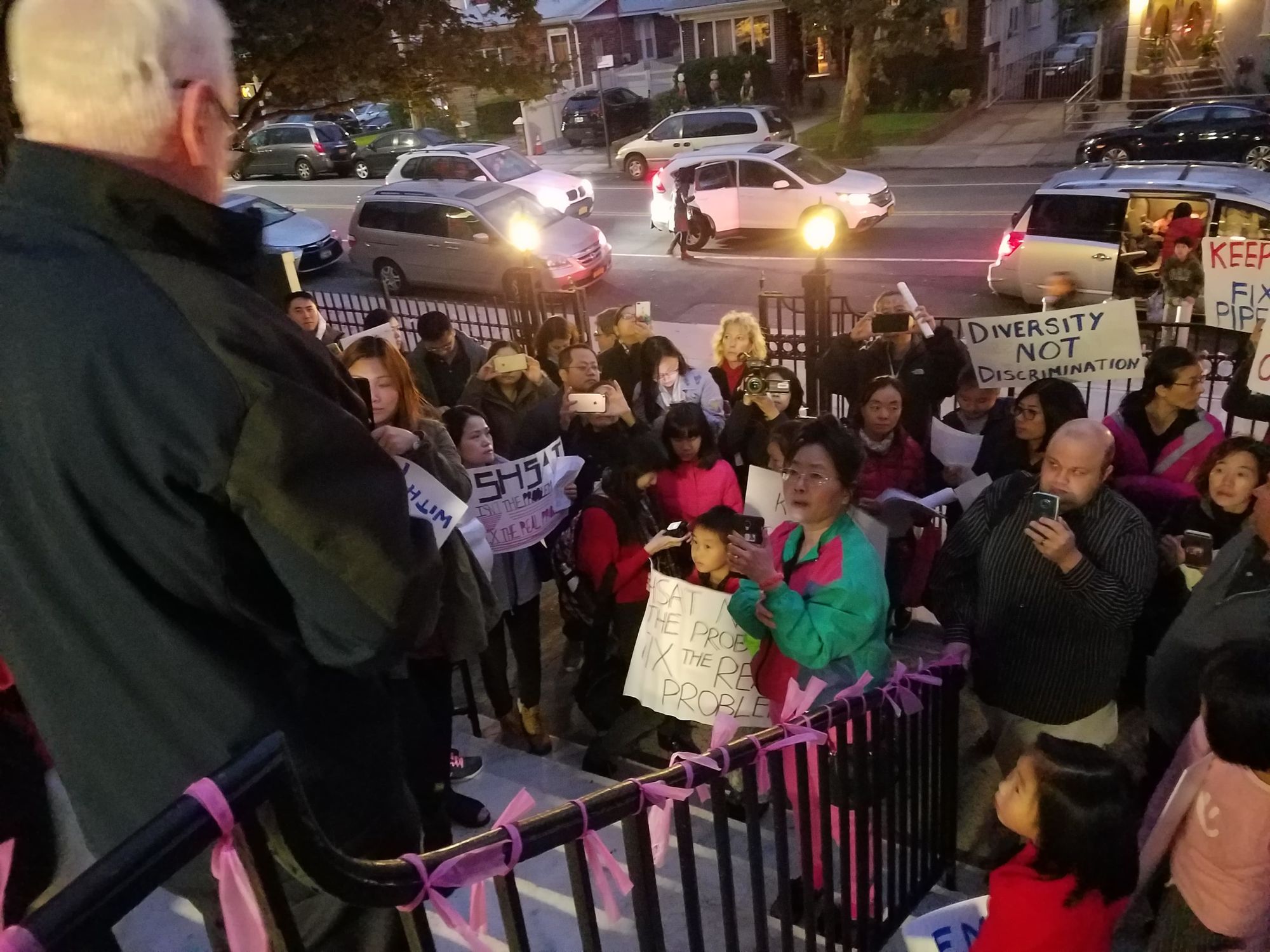City’s Plan To Change SHSAT Will Disproportionately Affect D20. Parents Had Lots To Say.
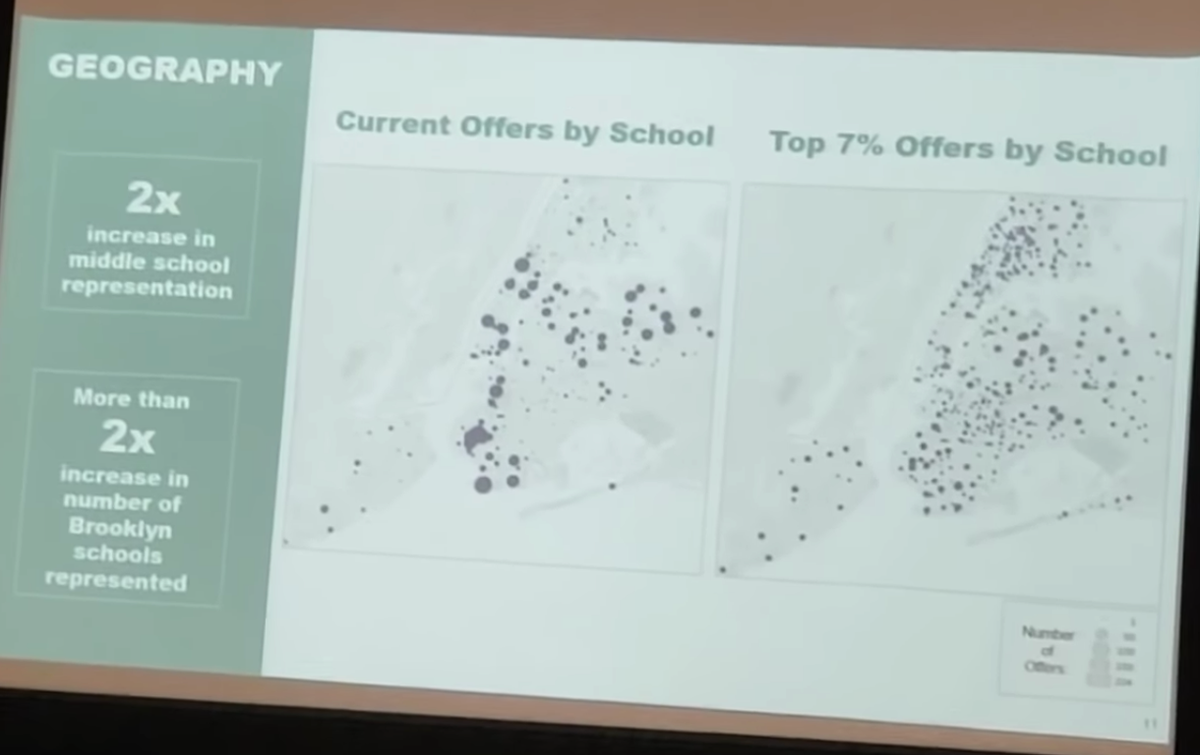
BAY RIDGE/BENSONHURST/SUNSET PARK/KENSINGTON – The October 17 meeting of Community Education Council for District 20, which stretches from Bay Ridge, to Kensington, and includes southern parts of Sunset Park and Bensonhurst, was a loud and passionate affair.
NYC Department of Education presented to parents its plan to reform the admissions process to the city’s Specialized High Schools, currently determined solely on the basis of a student’s performance on the Specialized High Schools Admissions Test (SHSAT). The Mayor wants a more diverse student body and has proposed admitting to 7% of students from each of the city’s middle schools.
In 2016, these 21 schools account for 50% of admissions:
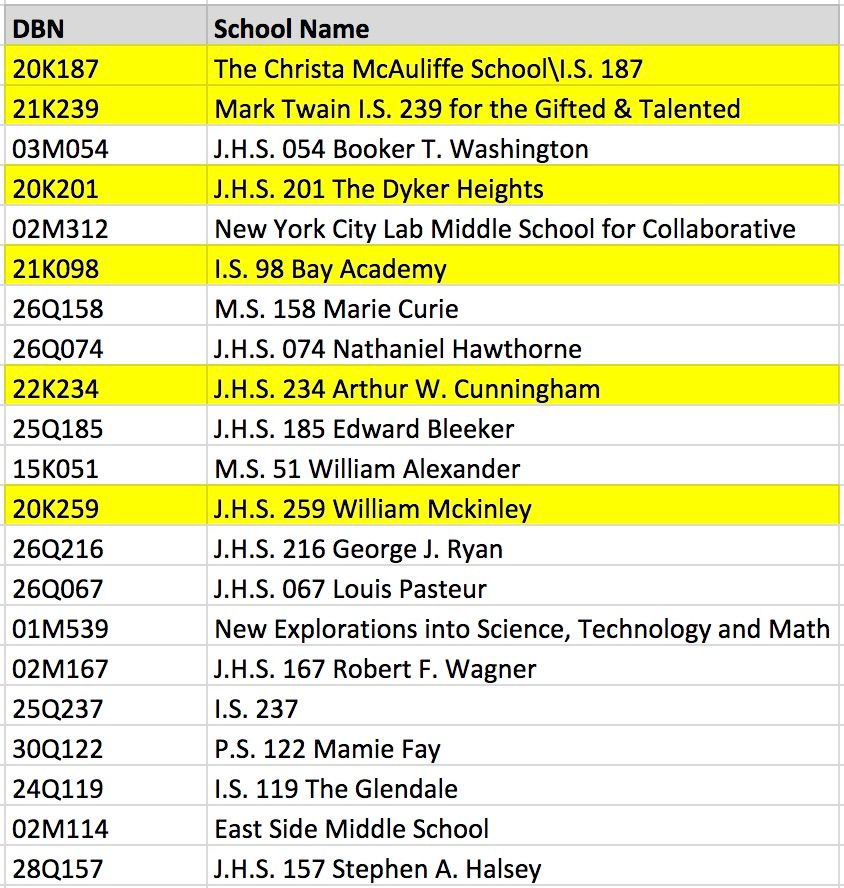
The meeting was held at IS201, Dyker Heights Middle School, that sends a third of its students to specialized high schools. IS187, The Christa McAuliffe School, sends something like 76% or about 220 students each year to Stuyvesant, Brooklyn Tech and The Bronx Science High Schools. The new plan would cut that to 7%, or about 18 students. It is easy to see why this is an issue in the community.
The proposed changes would disproportionately affect students from three Southern Brooklyn School Districts – D20 (Bay Ridge, Bensonhurst), D21 (Gravesend and Coney Island), and D22 (Flatbush, Midwood, Sheepshead, Marine Park). As we previously reported, students from these districts account for about a quarter of all students that enter the specialized high schools from a public school in NYC, and they also account for more than 72% of all Brooklyn public school kids that are admitted to the SHS, based on the Department of Education data from 2015 admissions.
Below is the video of the DOE presentation of the Specialized High Schools Proposal:
And below is a summary of how the DOE proposes to implement the changes:
Schools it will affect:
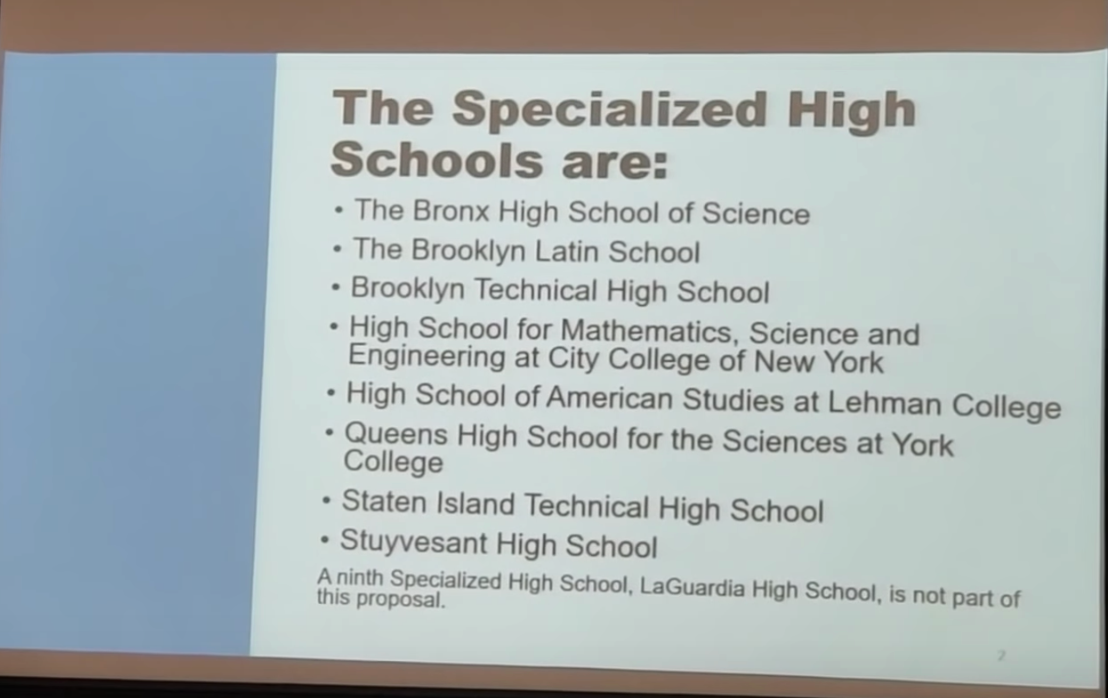
Will not affect LaGuardia. The first boos and disruptions came when the DOE dismissed the test as not the best indicator of student potential.
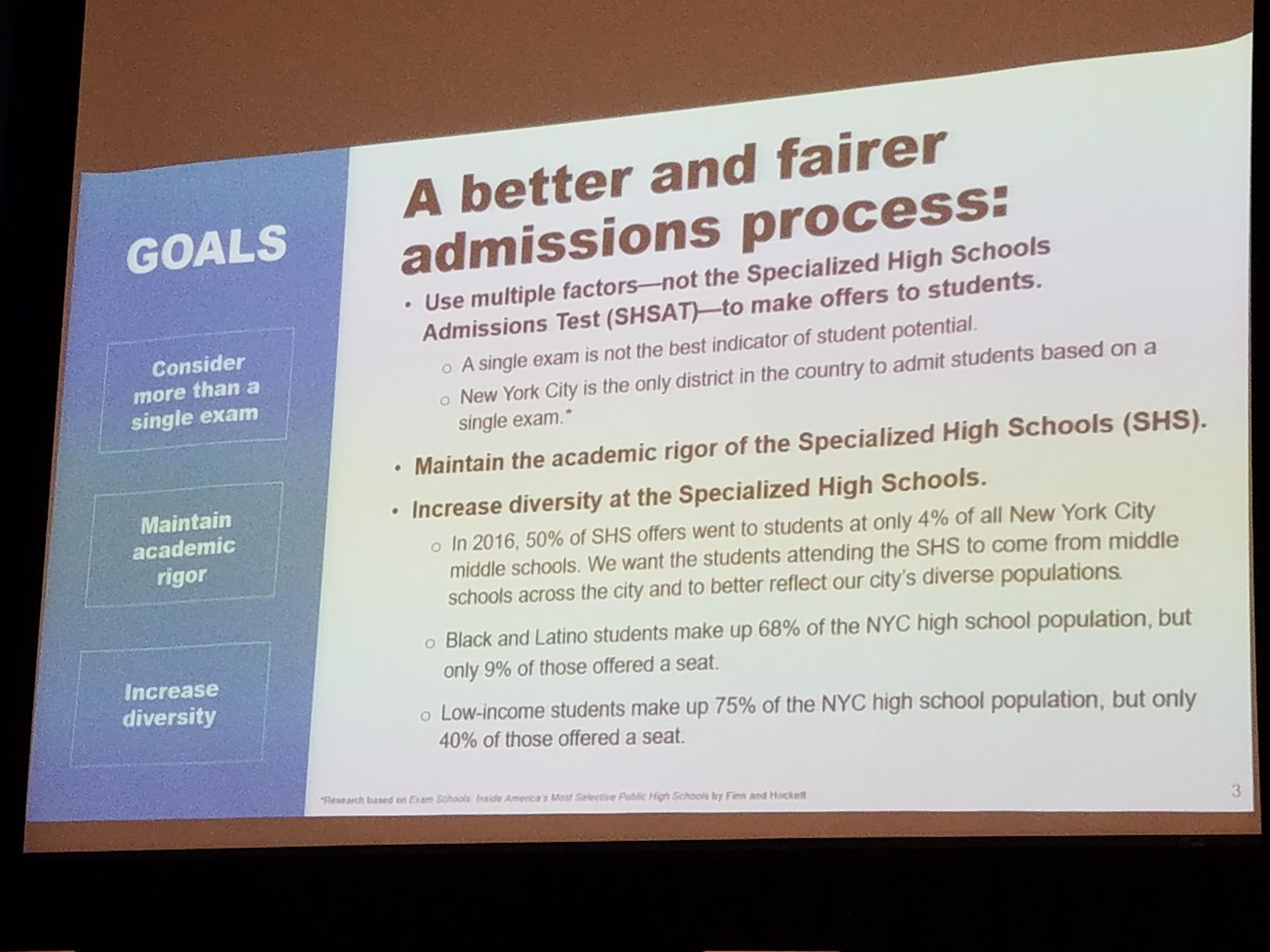
The actual proposal is as follows:
Part 1: Expand the Discovery Program to 20% of seats at each Specialized High School over the next two years.
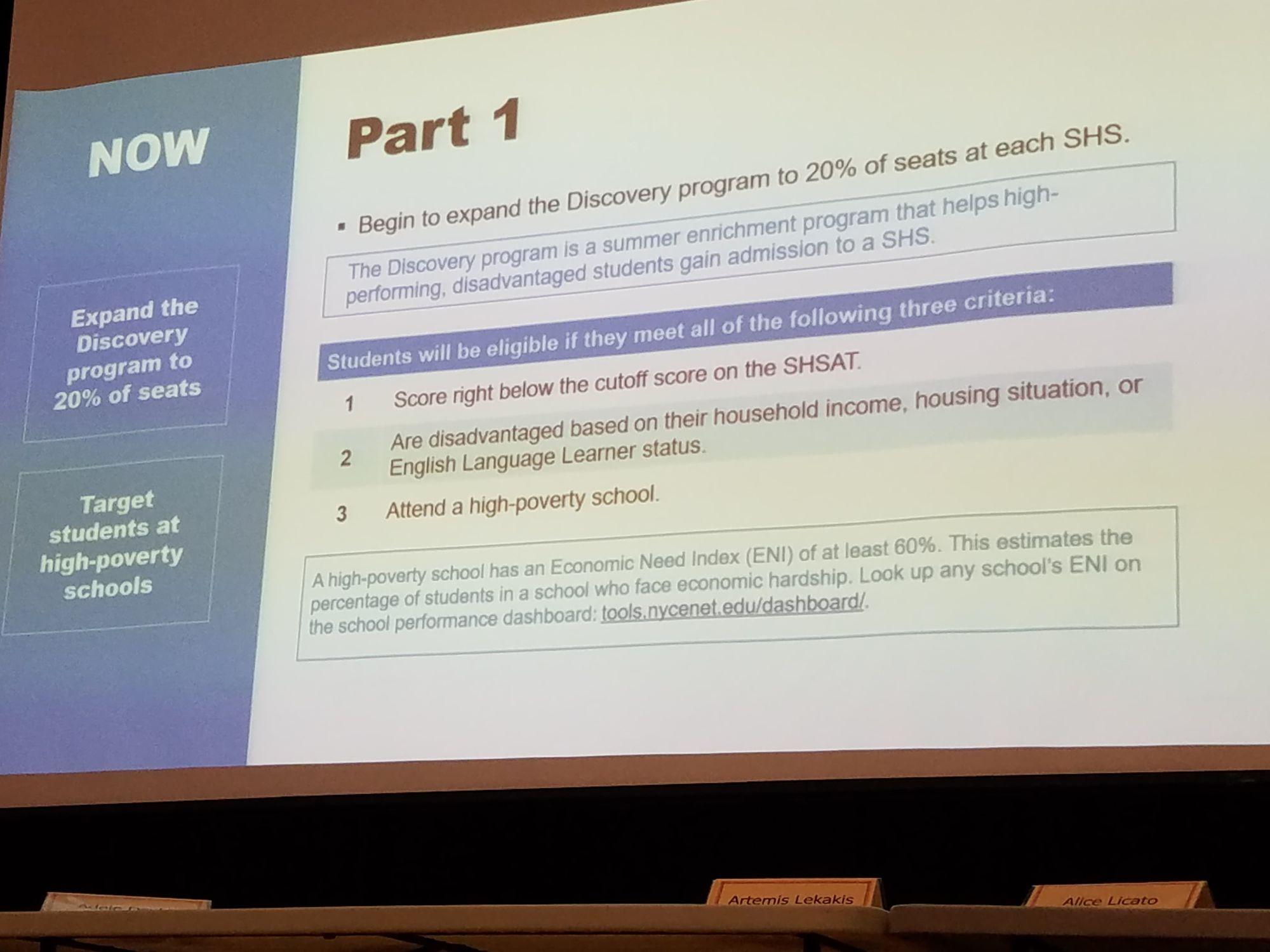
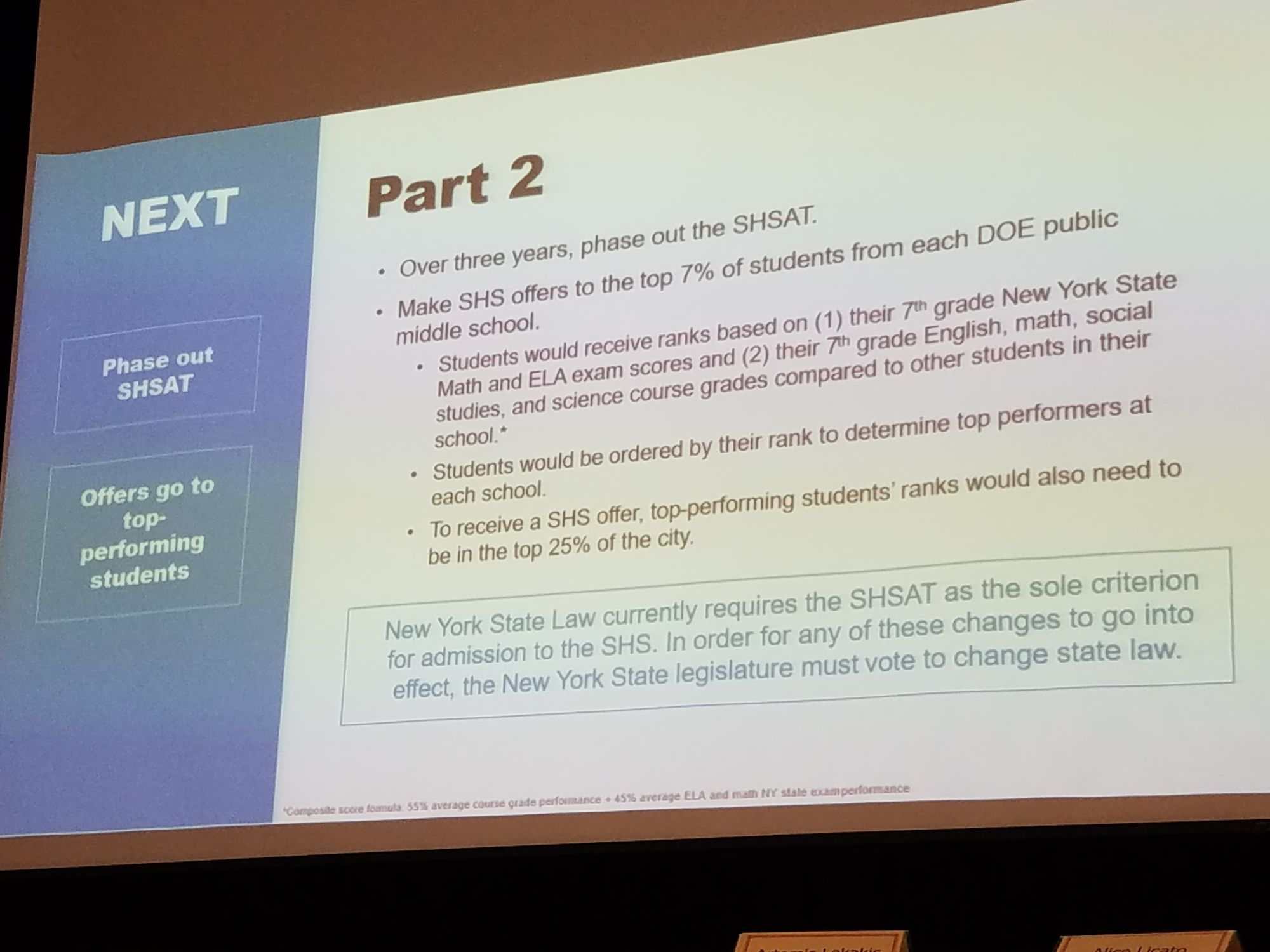
Part 2: Phase SHSAT out over three years. In year one, offers would go to top 3% of students at all middle schools based on 7th grade tests, which DOE estimates at about 25% of offers, and the remaining 75% of offers would be determined by SHSAT results. In year two, top 5% at each middle school would get accepted, and the remaining 50% of seats would be allocated via SHSAT. And in year three, top 7% of middle school students get accepted (about 90%) and the remaining seats assigned by lottery to students that have minimum course grade average of 93%. The top 7% at each school would need to be in the top 25% in the city. There would be no SHSAT.
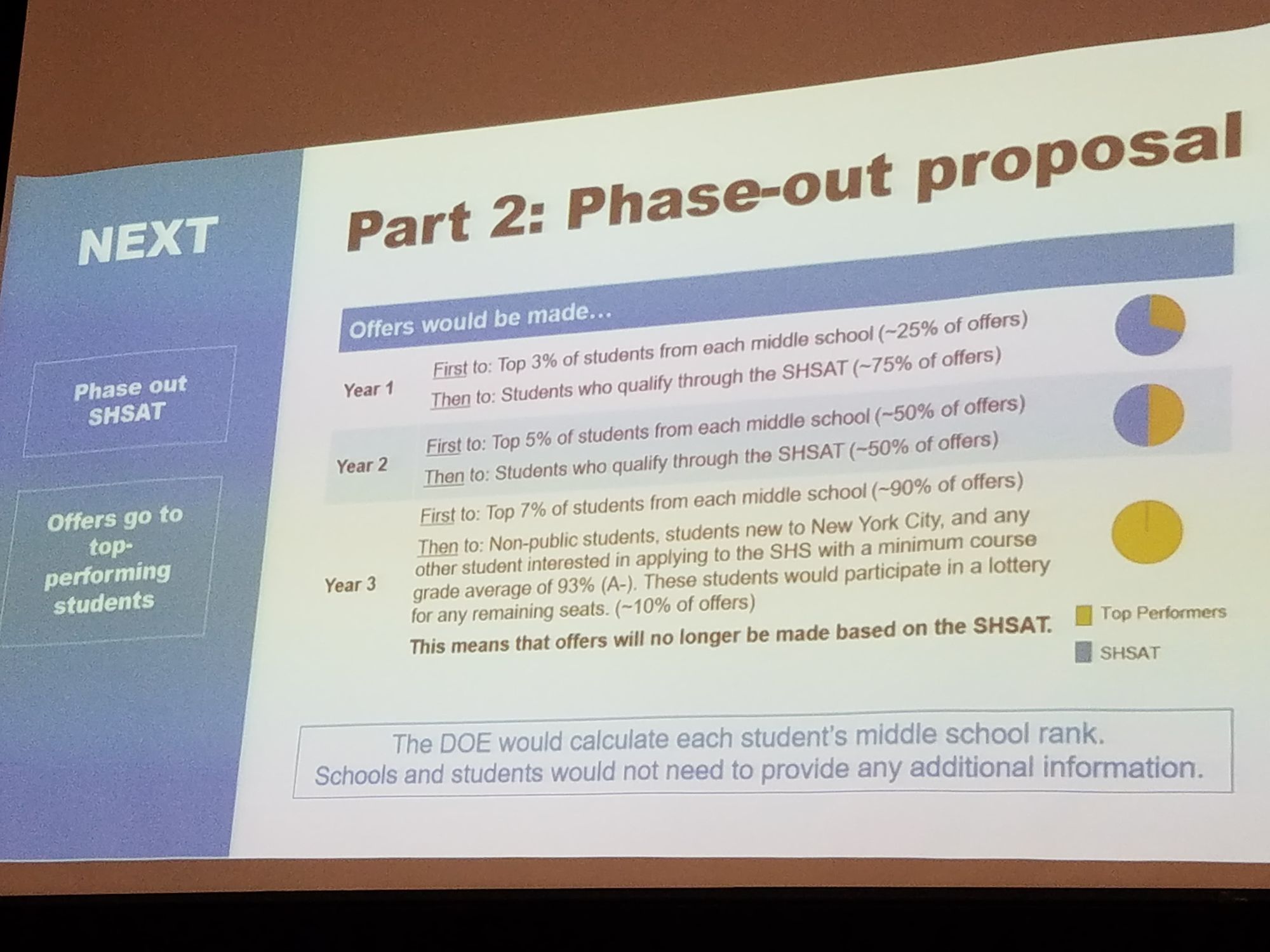
Officials argued that the average grades and test results for those obtaining admission to specialized high schools via SHSAT and the top 7% of students in the city are strikingly similar.
It is unclear whether the scores for top 7% presented were calculated based on actual test results of each middle school or top 7% citywide, which would ignore the fact that some schools like The Christa McAuliffe School have a high concentration of these top performers.
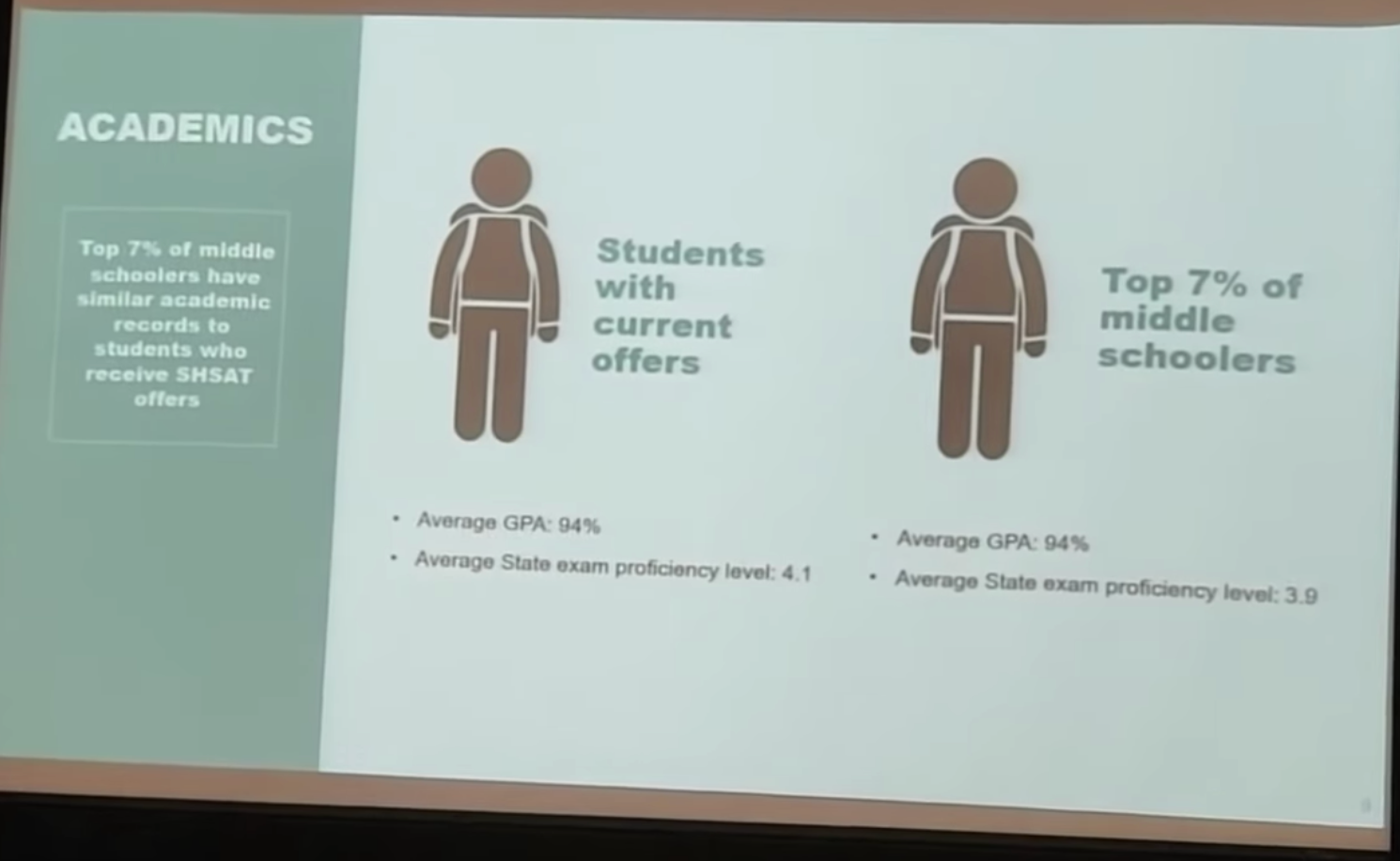
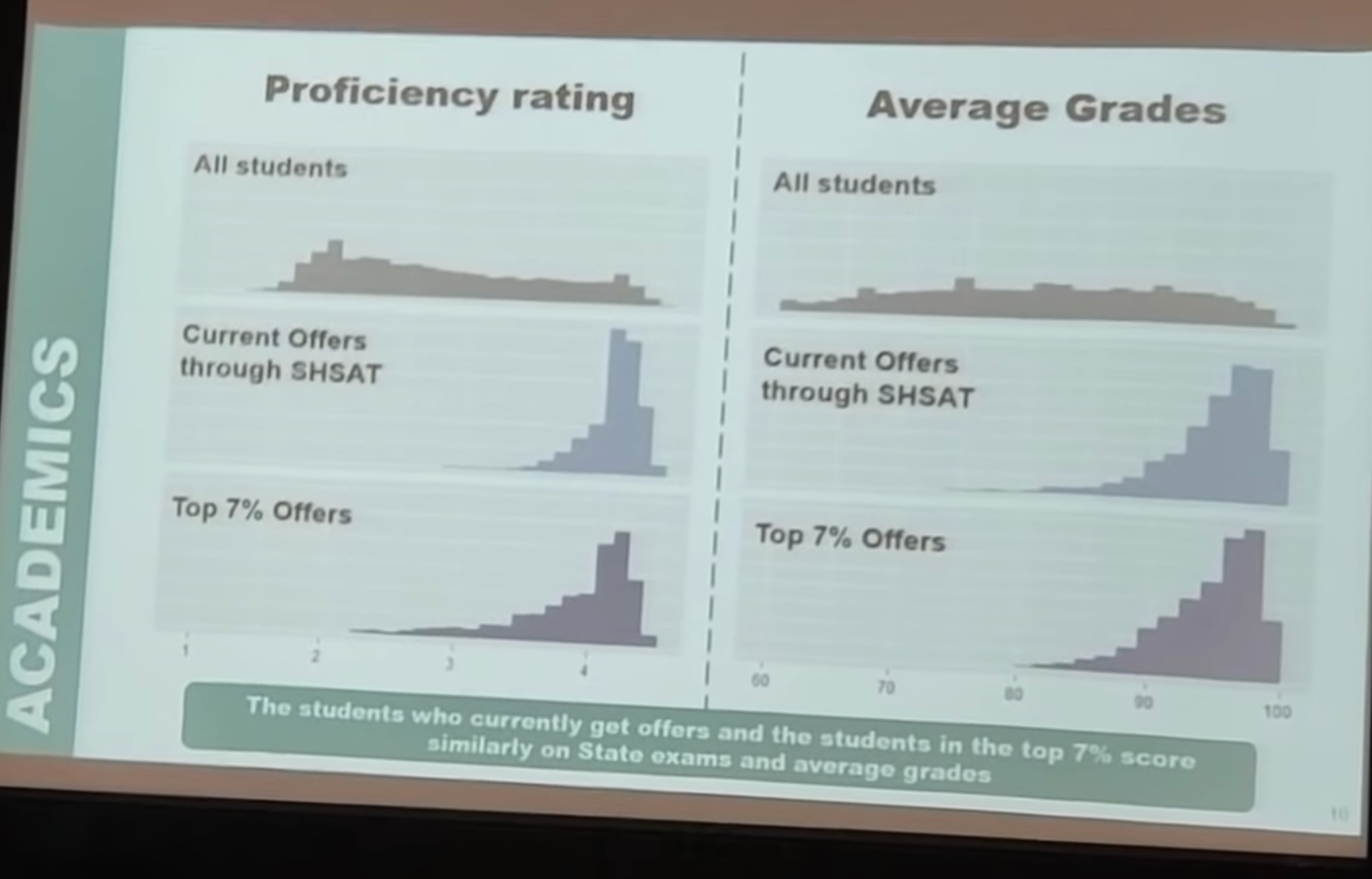
Geographically it looks as follows:

In the map above each dot is a middle school and the size of the dot represents how many kids from that school received an offer for a Specialized High School. Racially it would reflect the city as a whole, DOE believes:
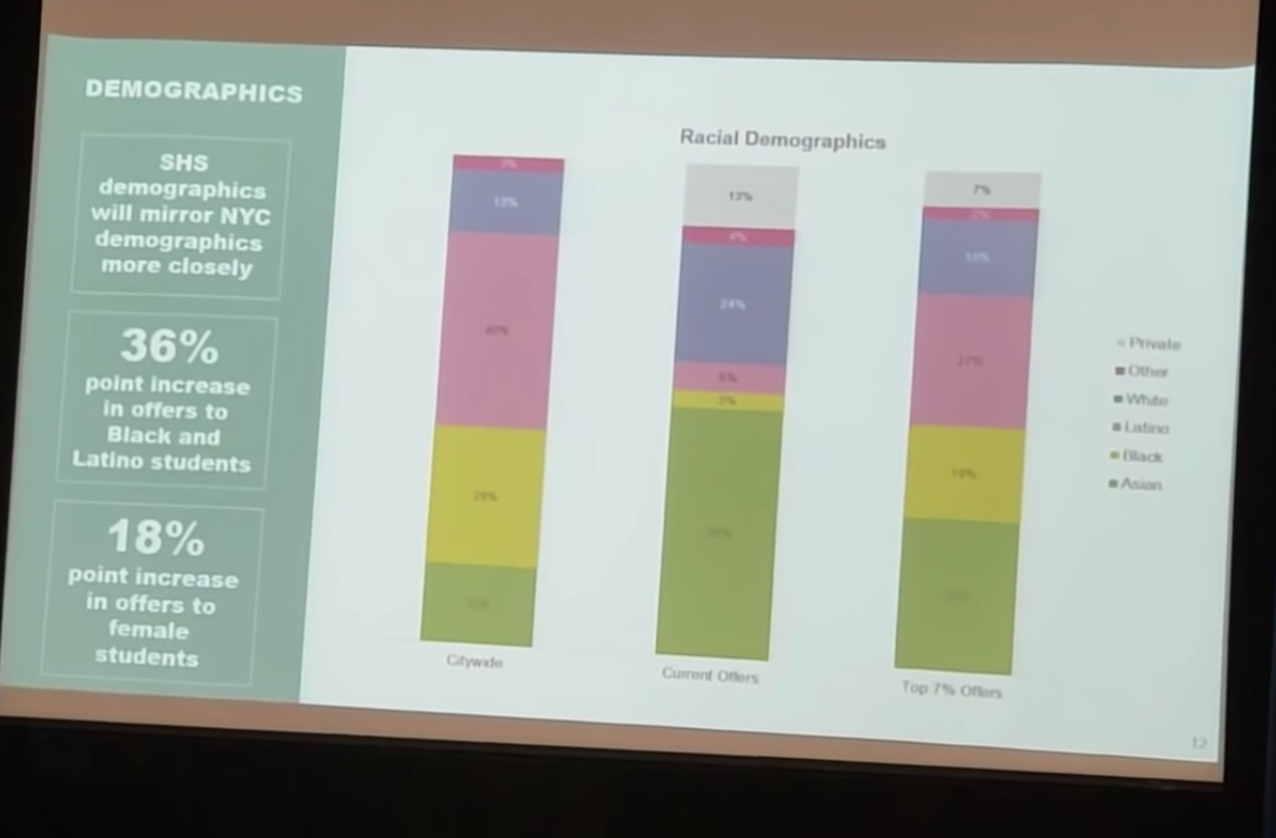
And more poor students woudl have access:
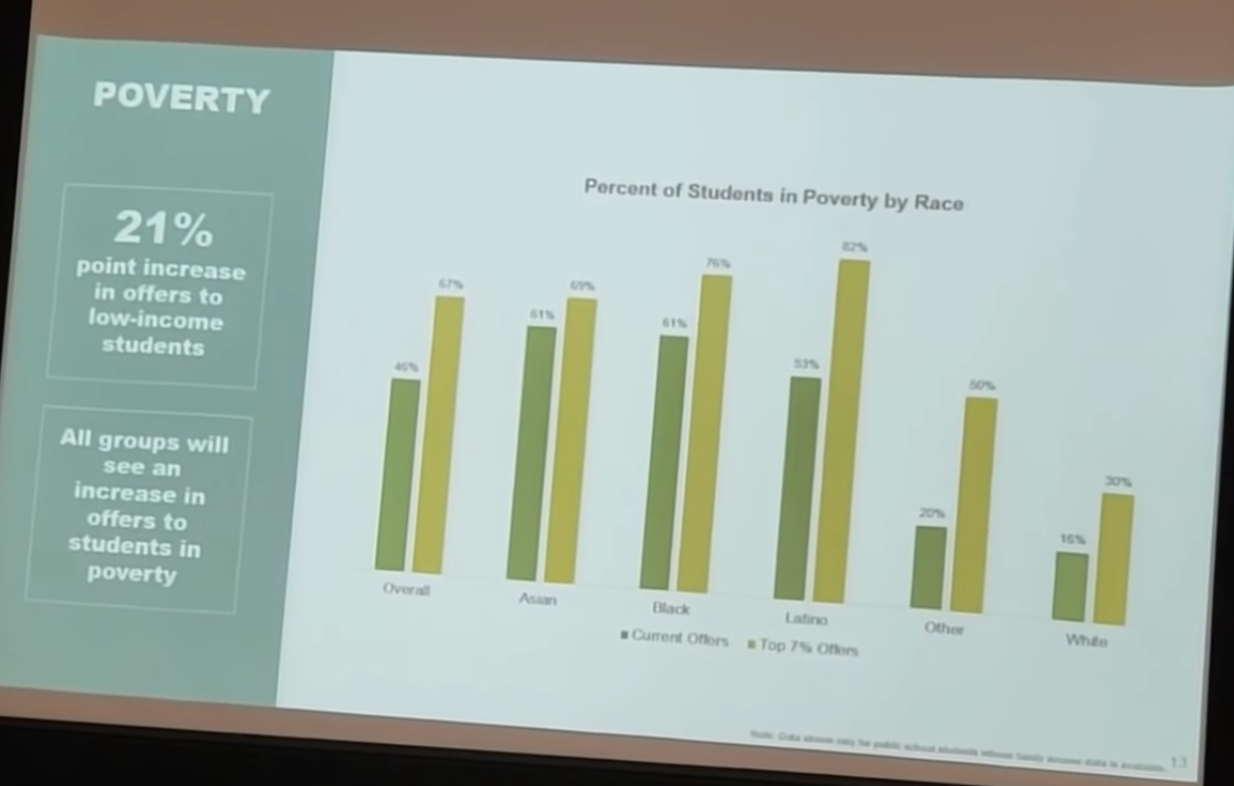
Discovery program will be expanded in the summer of 2020 to 20%. The rest of the plan is contingent on legislative approval.
Elected officials showed up. Peter Abate, Assemblyman, and said that specialized schools should not be remedial schools for struggling students. Andrew Gounardes spoke next, opposed the chaneges to test and argued for expanding specialized schools across the city, advocating for one in Southern Brooklyn. Assemblyman William Colton said “tonight was an attempt by educators to present as best they could a political agenda”, arguing that this is covering up a failure to educate kids across the city equally.
When it came to asking questions, parents were not happy with what they heard, or the fact that at 8:30 meeting was ended with a good number of those signed up not getting a chance to speak.
Here are the questions asked by the CEC President Adele Doye, summarized:
#1. How is this equitable for our district?
A: Did not answer the question.
#2. What happens to the students that no longer qualify for Specialized High Schools? (Of 221 from McAuliffe only 18 would be entitled to go)
A: Go to regular High Schools.
#3. That answer does not work for us. You are suggesting the rigor is the same throughout the city, which is not true. Why are we not building more Specialized High Schools?
A: We’ll bring this back to City Hall.
#4. Criteria – how is selecting top 7% of students at each school state exams fair and objective criteria? Are all schools are performing at the same level?
#5: How many of these students are not taking or performing well on the SHSAT if they perform similarly on state tests? Free prep is available. Is there are reason students are not using that?
A: The test is rigorous.
#6 How is one set of tests different from another as an objective measure?
A: We just don’t like SHSAT.
#7 How is this equitable to impoverished students who are putting in extra work to ace the test?
A: We just don’t like SHSAT, students should not have to prep outside of schools.
Ms. Doyle concluded by saying “Please take back to the chancellor that this plan is a disservice to the hard work that our district does to make our students the way they are.”
Marty Golden did not attend or speak at the meeting, but spoke to parents outside, of his strong support for SHSAT.
UPDATED 10/20/18 to correct that Andrew Gounardes opposes “changes to the test” not the test. He has always opposed these changes. Our apologies for the mistake.
